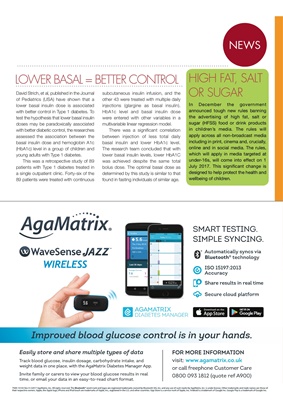
NEWS
David Strich, et al, published in the Journal
of Pediatrics (USA) have shown that a
lower basal insulin dose is associated
with better control in Type 1 diabetes. To
test the hypothesis that lower basal insulin
doses may be paradoxically associated
with better diabetic control, the researches
assessed the association between the
basal insulin dose and hemoglobin A1c
(HbA1c) level in a group of children and
young adults with Type 1 diabetes.
This was a retrospective study of 89
patients with Type 1 diabetes treated in
a single outpatient clinic. Forty-six of the
89 patients were treated with continuous
subcutaneous insulin infusion, and the
other 43 were treated with multiple daily
injections (glargine as basal insulin).
HbA1c level and basal insulin dose
were entered with other variables in a
multivariable linear regression model.
There was a significant correlation
between injection of less total daily
basal insulin and lower HbA1c level.
The research team concluded that with
lower basal insulin levels, lower HbA1C
was achieved despite the same total
bolus dose. The optimal basal dose as
determined by this study is similar to that
found in fasting individuals of similar age.
LOWER BASAL = BETTER CONTROL In December the government
announced tough new rules banning
the advertising of high fat, salt or
sugar (HFSS) food or drink products
in children's media. The rules will
apply across all non-broadcast media
including in print, cinema and, crucially,
online and in social media. The rules,
which will apply in media targeted at
under-16s, will come into effect on 1
July 2017. This significant change is
designed to help protect the health and
wellbeing of children.
FREE LIFESTYLE
BOOKLETS